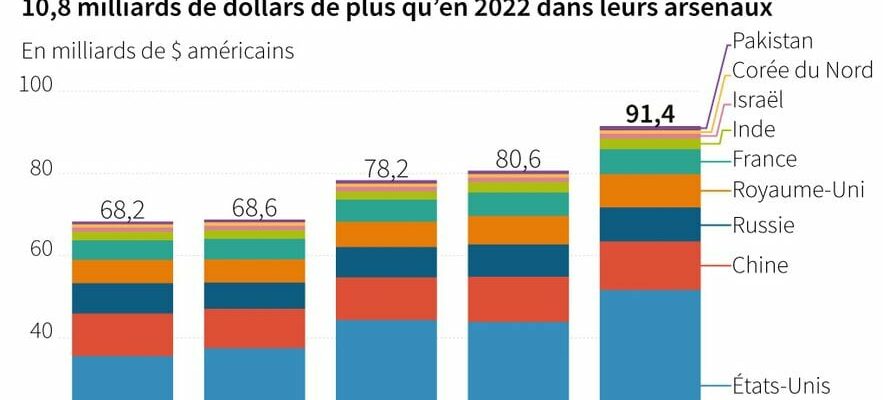Nuclear weapons continue to develop around the world. Over the past five years, its funding has jumped by a third, according to two reports published Monday June 17. The reason ? The increase in number and intensity of geopolitical tensions, which provoke a desire for protection among the nine holders of the nuclear army: the United States, Russia, China, the United Kingdom, France, India, Israel, Pakistan and North Korea.
According to the International Campaign to Abolish Nuclear Weapons (ICAN), these nuclear powers spent $91 billion (€85 billion) in 2023, $10.8 billion more than the previous year. A considerable increase which goes hand in hand with modernization, even the deployment of new atomic weapons technologies. The world remains in “a nuclear arms race”, judges Mélissa Parke, director of ICAN, based on this observation.
Increased spending on nuclear weapons
© / afp.com/Julia Han JANICKI, Maud ZABA
Currently, the United States accounts for 80% of this increase: its share of total spending ($51.5 billion) “is greater than that of all other nuclear-armed countries combined.” This is followed by China ($11.8 billion) and Russia ($8.3 billion). Then the British who significantly increased their spending (+17% to $8.1 billion), for the second year in a row. Overall, the amount spent on nuclear weapons has increased by 33% since 2018.
Period of great geopolitical instability
This spectacular increase in funding for atomic weapons reflects a dark geopolitical reality. According to Wilfred Wan, director of the Weapons of Mass Destruction Program at the Stockholm International Peace Research Institute (Sipri), “since the Cold War, nuclear weapons have never played such an important role in relations international”.
“We are currently living through one of the most dangerous periods in the history of humanity,” also warns Dan Smith, director of Sipri. “The sources of instability are numerous: political rivalries, economic inequalities, ecological disruptions, acceleration of the arms race. The abyss awaits us and it is time for the great powers to step back and reflect. Preferably together” , he calls.
An unlikely trajectory: in February 2023, Russia announced suspending its participation in the “New Start” treaty, the latest control treaty limiting the strategic nuclear forces of Russia and the United States. In May 2024, Moscow also conducted exercises involving tactical nuclear weapons on the Ukrainian border. A situation which is expected to continue, and “probably accelerate” in the years to come.
9,585 operational nuclear warheads
Because according to Sipri, even if “the total number of nuclear warheads continues to decrease as Cold War-era weapons are gradually dismantled”, the number of “operational nuclear warheads” is- i.e. ready for use in the short term, increases from year to year. Concretely, there are currently slightly fewer warheads this year than last year: 12,121 worldwide at the start of the year compared to 12,512 a year earlier. But of that total, 9,585 of them are currently ready for potential use, nine more than last year. The rest is in theory destined to be dismantled.
Of these, 2,100 are kept on “high operational alert” – immediately usable via ballistic missiles. Almost all of these belong to Russia and the United States, which alone possess 90% of the world’s nuclear weapons. Sipri also estimates for the first time this year that China holds “a few warheads on operational alert”.
“Financing Armageddon”
This development of nuclear power leads to expenses described as “obscene” by the director of ICAN, who points out the fact that this sum represents more than what the World Food Program considers necessary to put an end to hunger in the world. These investments are not only unnecessary, but also extremely dangerous, warned the director of ICAN, an organization which was awarded the 2017 Nobel Peace Prize for contributing to the adoption of a historic ban treaty. of atomic weapons.
Although 70 countries have ratified the treaty, no nuclear power is a signatory. “Instead of investing in Armageddon, the nine nuclear-weapon states should follow the lead of nearly half the world’s countries and join the treaty,” said Alicia Sanders-Zakre, who co-wrote the ICAN report.
